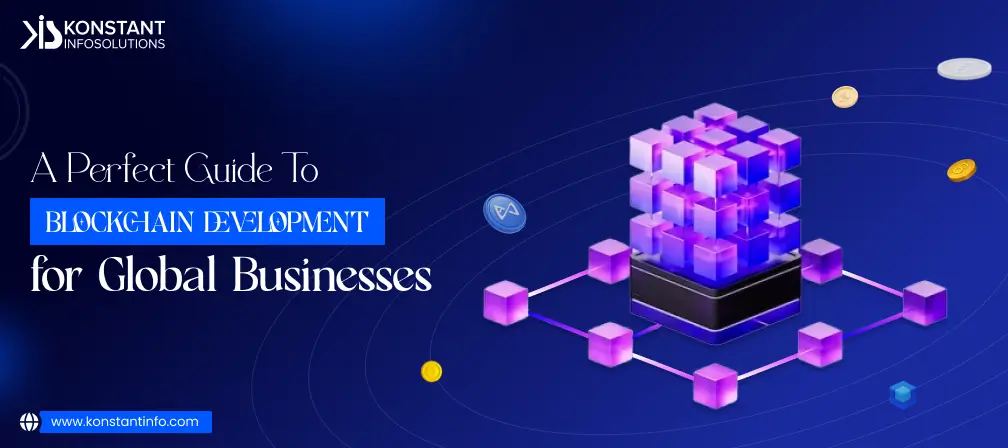
 Businesses are now turning towards blockchain technology and understanding the benefits it can offer. The technology is already prevalent in the financial sector due to the features like security, transparency, versatility, and efficiency. As of 2023, the market is valued about $17 billion US dollars and is expected to grow to whopping $1235 billion industry.
Businesses are now turning towards blockchain technology and understanding the benefits it can offer. The technology is already prevalent in the financial sector due to the features like security, transparency, versatility, and efficiency. As of 2023, the market is valued about $17 billion US dollars and is expected to grow to whopping $1235 billion industry.
Seeing the scenario, enterprises, professionals, and even startups are trying to understand the blockchain development services and get their share of benefit. Here, we are covering everything you need to know about blockchain technology and the advantages it can offer.
“As of 2023, the blockchain technology market is valued over $17.46 billion – As per Grand View Research”
Blockchain is a technique for recording data that is intended to make data kept on the blockchain secure and unchangeable by making it hard to hack the system or fabricate the data. It’s a form of distributed ledger technology (DLT), which is a digital record-keeping system that allows for the simultaneous recording of transactions and related data in several locations.
“By 2030, Blockchain technology is expected to boost Global GDP by over $1.7 trillion”
The blockchain technology has taken the world by storm with its robust security and transparency features. Businesses in several industries are widely adopting this tech around the world, including supply chain, healthcare, and finance. Out of this, BFSI, i.e. finance, contributes the major part, about 1/3rd of the total market, followed by Healthcare.
Geographically, North America has the highest share in the technology due to the presence of major market players in the USA.
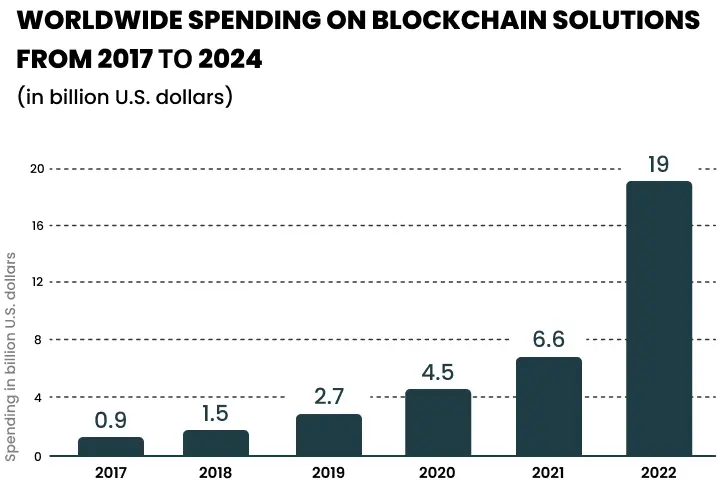
In some cases, merging the greatest features from both worlds will benefit enterprises. Hybrid blockchains allow for the creation of both a public and private system. With its assistance, businesses can effortlessly manage which data is available across all networks and to whom.
In contrast, private blockchain will only allow participation from those who have been granted authorization. The network’s members’ transactions are governed by a set of rules. This kind of blockchain is thought to be appropriate for managing operations in businesses.
Anybody connected to the network can access and use a public blockchain on any device. Every user can see every transaction, interact with other users, be anonymous, and have total access to the code.
Also known as Consortium, this blockchain type has a validator node that can initiate, receive, and validate simple transactions. Member nodes are not able to validate transactions; they can only send and receive them.
Blockchain development services refer to building, maintaining, & creating blockchain systems and apps. In general, it aims to take advantage of the special qualities of blockchain technology to solve issues and provide possibilities.
The smart contract is one example of blockchain development. Like traditional contracts, smart contracts are written agreements between two parties. However, smart contracts are also programs that are kept on a blockchain, unlike regular contracts. These programs don’t start unless both parties fulfill their end of the bargain regarding terms and conditions. Real-time accurate contract execution is guaranteed by this automated compliance.
One of the most important elements in the successful execution of a business deal is trust. When working with a new business, we frequently enlist the help of a reputable third party to oversee and validate the transaction. However, you may do trustworthy business transactions with any firm thanks to blockchain technology.
Blockchain introduces and links you to other parties that you would not have dealt with in a traditional transaction. Additionally, you would feel at ease sharing a variety of data and transactional information that you otherwise wouldn’t have shared thanks to blockchain.
Blockchain transactions are unregulated by the federal government or any other government body since they are decentralized. There are situations when a process’s independence fosters user trust.
There is no single organization in control of the process; instead, data and information freely move between many businesses. A supply chain made up of manufacturers, distributors, retailers, and suppliers processes the data.
In a system such as a blockchain, your anonymity is protected. All parties engaged in the transaction can enjoy a high degree of privacy thanks to the blockchain technology, which differs from the conventional computer system.
The immutability of the transaction process provided by blockchain instills a great level of integrity and confidence in the companies and stakeholders. Additionally, everyone who wishes to examine a specific detail of your transaction is granted a set of permissions by the blockchain system.
Businesses worldwide have been concerned about security for all kinds of transactions. Blockchains, however, guarantee the safety and security of your transactions. They possess an untraceable log of end-to-end encrypted transactions. It ensures that your data is safe from fraudsters and hackers.
Furthermore, transactional data in blockchain is kept across several computer systems. Because all the data is kept on a single computer system in the old method, this makes the blockchain-enabled system far more secure.
In terms of efficiency and speed, blockchain transaction methods outperform traditional ones. Because blockchain-enabled technologies cut out middlemen and save time, many firms want to utilize them.
A transaction on a blockchain may occasionally be finished in less than a second. The idea of a transaction per second (TPS) is relevant here. It is the typical quantity of network transactions that occur in a second.

You can easily obtain your transaction data with the entities who share a personal node with each other because blockchains are decentralized. Blockchain explorers allow users to see their transactions in real time.
The transparency nature of blockchains makes tracking down problems quite simple. If someone tries to tamper with our data, we can simply find out. Additionally, copies of the data are held by all parties participating in the transaction process.
It gets a little challenging to track down a product’s original manufacturer in a conventional transaction process. On the other hand, blockchain-enabled technologies allow you to quickly track your transactions because the data is kept in nodes. An audit trail can be used to determine the source of an asset.
To confirm the legitimacy and security of your transaction, you may also view each step of the procedure. Blockchains’ traceability function is an excellent approach to find out where a product came from or where it might have had a problem.
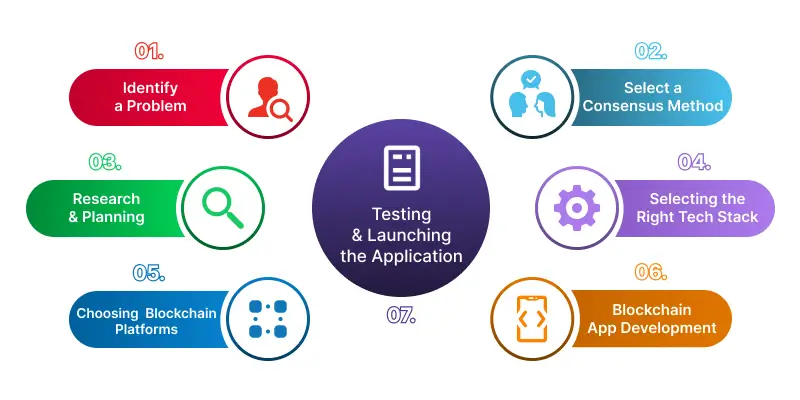
Finding a real-world issue that a blockchain application can solve is the first stage in the blockchain development process. Work together with developers, designers, consultants, and business analysts to identify the issue’s underlying causes and the ways in which the Blockchain-based solution may address them. Hiring a reliable blockchain development company can prove a cost efficient solution to the issue.
Selecting the most appropriate consensus method is the next stage, as each has advantages and disadvantages of its own. The best consensus mechanisms from the plethora of options available online are determined by factors like the required level of decentralization, key performance indicators, and business requirements.
Some of the most common consensus methods are –
The plan for developing blockchain technology is developed in this step by the blockchain development company you have hired. Researchers, consultants, designers, and developers choose how best to integrate the technology into the ongoing operations. It includes thorough project planning as well as a number of crucial technical choices that are necessary for Blockchain development process to be effective.
Selecting an appropriate blockchain programming language is essential since it affects how users communicate with the Blockchain. One of the things to consider while selecting a language is interoperability. The Blockchain development process uses a number of common programming languages, such as HTML/CSS, PHP, Python, Golang, Node JS, Javascript, C#, Ruby, Java, and Solidity.
Choose a database after deciding on the blockchain programming languages. Two popular databases among developers are MongoDB and MySQL.
It is not necessary to create a blockchain from scratch thanks to blockchain platforms available already in the market. These platforms are meant to speed up, facilitate, & ease the blockchain development process. Examine the platform’s features and limitations to ascertain whether the platform you are selecting is appropriate for the demands of your project.
Some of the most popular blockchain platforms are –
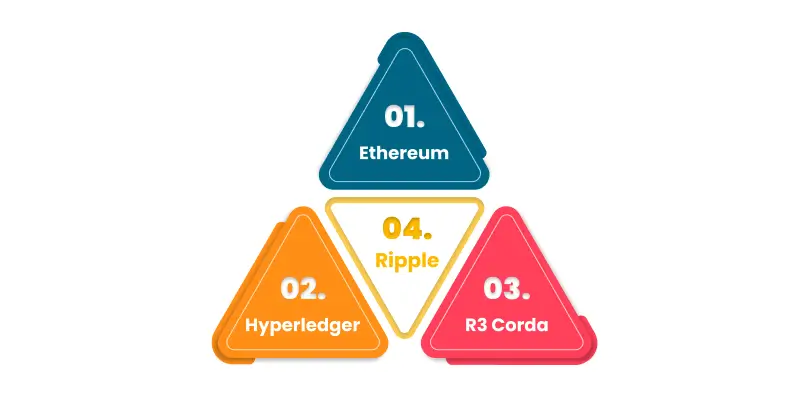
Development is the most important stage of the process where the team starts building the platform. Either the team can build the app from scratch or integrate APIs for a specific use case. The app is built in phases or parts using the agile development methodology. The architecture, prototype, and design are changed into a fully functional app.
The team builds blockchain infrastructure and smart contracts, test them, and then integrates them with the existing systems. This is the most time taking stage of the blockchain development process and the most important one perhaps.
An early version of the project is prepared for testing, having completed the preceding procedures. The core functionalities are the emphasis of this stage of the Blockchain development process. To identify possible problems, developers use a variety of testing methodologies. Following testing, the application offers some real benefits and is prepared for commercial release.
The average cost of blockchain app development is dependent on a number of variables, including whether the blockchain is developed from scratch or using an existing platform, the cost of the team, the complexity of the project, node maintenance, scalability, and many other things. The location and experience of the blockchain development company can have a big impact on rates.
Simple Apps – For small-scale or proof of concept (PoC) initiatives constructed on an already-existing platform, like smart contracts, a range of $5,000 to $20,000. It is not necessary to start from scratch when creating a blockchain for these kinds of projects.
Medium App – $20,000–$50,000 range for medium-sized blockchain platforms
Complex App – For large-scale company initiatives requiring unique blockchain network construction, the range of costs is between $50,000 and $100,000+
| Blockchain App Complexity | Blockchain App Development Cost |
| Simple | $5,000 to $20,000 |
| Medium | $20,000 to $50,000 |
| Complex | $50,000 to $100,000+ |
The second thing you should consider is whether or not you actually require a smart contract. As you may already be aware, a smart contract is a self-executing protocol that handles, verifies, or implements any trigger-based command that is saved on the blockchain.
Some blockchain systems rely on cryptocurrencies, while others use smart contracts or a combination of cryptocurrency tokens. Selecting the best type for you will simplify the process of developing Blockchain apps.
A variety of consensus protocols, such as Proof of Work, Proof of Stake, Proof of Elapsed Time, and Proof of Burn, are utilized by various blockchain platforms. Therefore, choosing the appropriate platform based on consensus protocol is also a good thing.
Those looking to leverage current innovations to create blockchain platforms should consider whether their needs will be satisfied by looking at the transaction capacity. Three key factors are taken into account while analyzing blockchain scalability: decentralization, security, and speed. This is referred to as the Scalability Trilema and indicates that any developer can aim for, at most, two of the three attributes.
Consider the type of network you desire: one in which anybody can join and edit the network, or one in which only authorized users are allowed to do so. Select the platform and begin developing your own blockchain application based on the decision.
For a contemporary blockchain, it is imperative to consider the Adoption rate as well as the level of Community Support. The degree of implementation that a particular blockchain innovation has received is measured by its adoption rate. Choosing a technology with a high adoption rate is a wiser move than selecting one with a low adoption rate.
So, this was all about blockchain development technology and the benefits for organizations. Enterprises can enhance their security, reduce costs, and boost customer trust with the help of blockchain. However, the technology is still fresh in the market and there are only a handful of reliable players. Hiring a Blockchain development company in India is an affordable yet good option. Top companies like TCS, Infosys, and Konstant Infosolutions assure timely delivery, satisfied results, and use latest tools to build robust products.
Further, if you have an idea in mind or looking for someone to provide blockchain development services and discuss your next project, then you can contact our experts here and get an insight.
Till then, keep thinking, keep building!!!
Blockchain app development refers to the process of building, maintaining, and supporting a blockchain app or system. In general, it aims to take advantage of the special qualities of blockchain technology to solve issues and provide possibilities.
Building a blockchain app requires significant time and varies based upon complexity, app design, and functionality required. The exact timeframe can be given after understanding project requirements. However, to give a rough estimate, it can take anywhere between a few weeks to several months.
The cost to build a blockchain application varies and is based upon several factors, including app design, complexity, functionality, development team location, industry compliance, etc. Here is a rough idea about the cost of blockchain app development based on size –
There are several blockchain platforms in the market but the most popular ones are –
The global average blockchain developer rate is $80 – $100/hour; however, it varies greatly geographically and with years of experience. For instance, a blockchain developer charges between $20 and $40 while the same price goes to $150 – $200 per hour in North America.
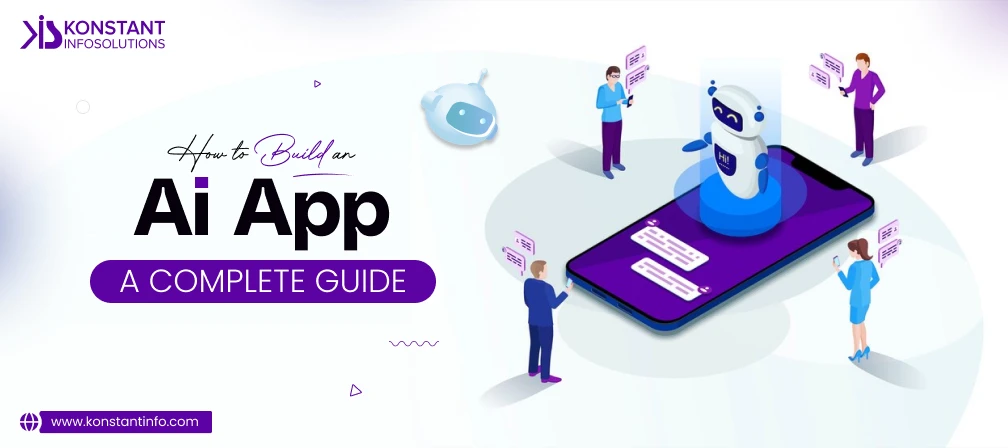
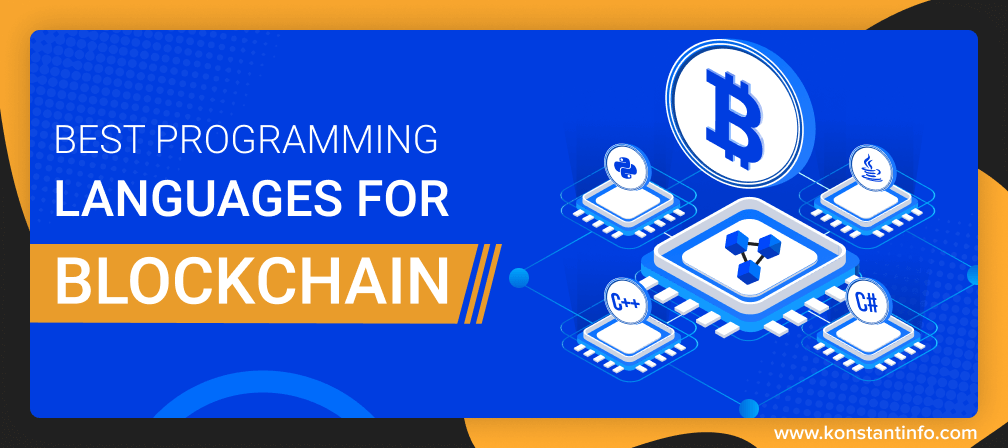
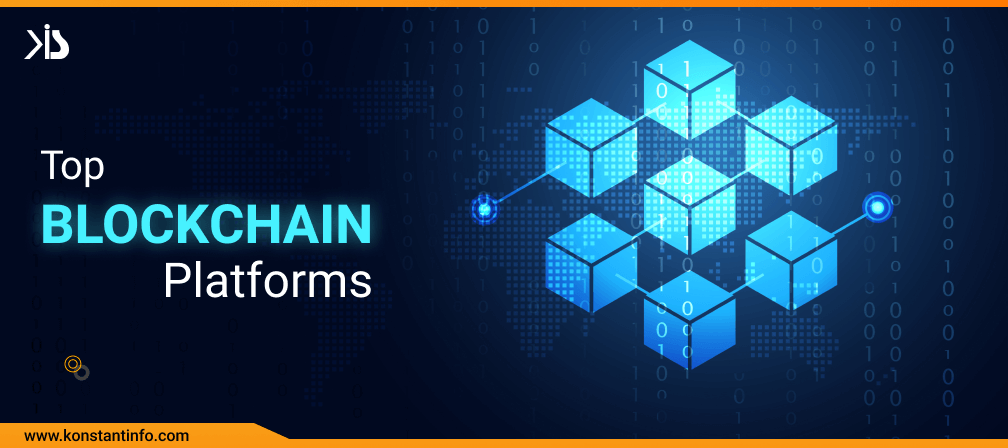
Manish Jain is the co-founder and Managing Director at Konstant Infosolutions. He is responsible for the overall operations of the company and has played a major role in bringing Konstant up from its humble beginnings and, with his immense energy and drive, transforming it into a globally trusted name in IT solutions.
Or send us an email at: [email protected]